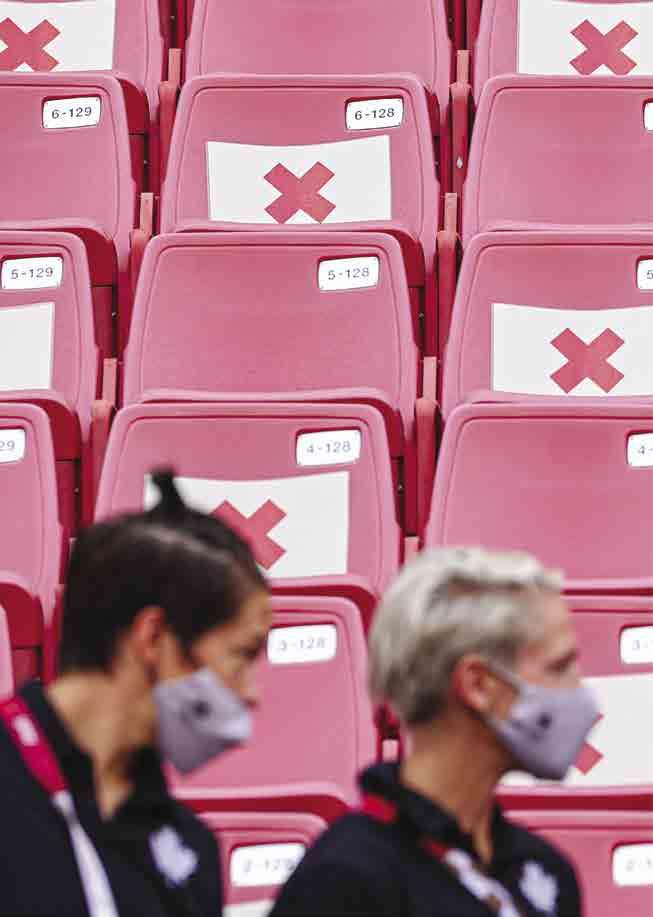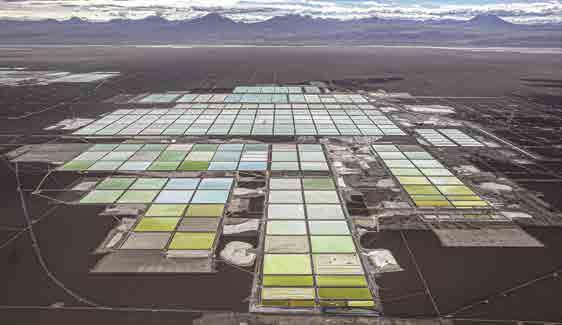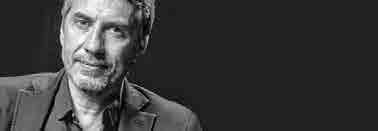
11 minute read
Overcoming Crises with Cohesion
Overcoming Crises with Cohesion
The attack on the Twin Towers in 2001, the economic crisis of 2008, the pandemic in 2020...
Advertisement
Our development model carries turmoil and complexity that we will have to learn to forecast and manage. But we must change our perspective.
BY MAURO MAGATTI — SOCIOLOGIST AND ECONOMIST
The pandemic is the third shock to globalised societies in the past two decades. The attack on the twin towers on 9/11, 2001 burst open the question of the relationship between cultures that produced this act of terrorism – a problem that has yet to be decisively eradicated. Seven years later, in 2008, the financial crisis that began with subprime mortgages sent shockwaves throughout the global markets, with significant consequences on geopolitical assets and the psychosocial climate of many democracies. Then, in early 2020 came the global health crisis that we are yet to emerge from. The arrival of the vaccine in record time is allowing us to halt the pandemic, although the process is proving slower and more complicated than any of us could have foreseen.

People mourning at the 9/11 Memorial in Manhattan, New York City, U.S., September 11, 2021. The 20th anniversary of the 9/11 attacks in 2021 was set against the backdrop of the global pandemic.
REUTERS / JONATHAN ERNST
It is therefore important to adopt the proper perspective in understanding the coronavirus, and more importantly, in visualising the future: various international reports have documented how the world we have built since the end of the 20th century has become extraordinarily powerful, but also highly entropic. Our model of development, while enabling us to reach unprecedented milestones, also exposes us to risks that sooner or later lead to shocks. The World Economic Forum has identified five types of shock: economic (deflation, financial crises, unemployment, financial bubbles, etc.); environmental (loss of biodiversity, climate change, extreme weather events, natural disasters, etc.); geopolitical (international conflicts, nation-state collapses, terrorist attacks, mass destruction, etc.); societal (food shortages, epidemics, mass migration, social stability, etc.); and technological (cyberattacks, data theft, infrastructure malfunction, etc.). As realists, once we have recovered from the coronavirus pandemic, we should set about asking ourselves: what will be the next shock? In order to look ahead, we need to change our perspective and learn to steer our way through the complexity that our development model inherently continues to increase. The bonds that connect the planet’s residents to each other and to their environment are so many and so intertwined that they can no longer be treated as an afterthought.
We are facing years of profound and rapid transformation, even if the outcome is still largely unknown. What we can say with certainty is that the early part of the 21st century is the time for us to recognise the improbable likelihood of continued economic growth with increased entropy. The matter of the “energy transition” must be seen in the wider context: we cannot think about decarbonisation of production and investment in renewable energies without tackling social and psychological entropy. The former is at the root of the many faces of the modern crisis: demographic disorder, democratic decline, increasing inequality, commodification and exploitation of labour, corruption; while the latter is manifested in disorganisation of the self and in the blocking of libidinous investment made possible by consumption. Félix Guattari was writing about this back in 1989: “environmental ecology should be thought of as one piece with a social ecology and mental ecology...” If “the ecological disruptions of the environment are only the visible part of a deeper and larger problem, concerning ways of living and being in society on this planet”, then it followed that “it is quite simply wrong to regard action on the psyche, the socius, and the environment as separate.” To heal (and take seriously) the fault-lines that are affecting our societies, we must weave a new fabric of values to abide by and forge a new sense of common purpose. This is a task for progressives and conservatives in equal measure. To borrow a term from Max Weber, a “new spirit of capitalism” that enables our economic and political assets to withstand the pressures of the age we are living through.
Is there any sign of movement in this direction? Nothing deliberate and convincing. It is likely, however, that the aggregation of the leading forces that are already moving towards new solutions may rally around expanding the concept of sustainability. Ultimately, if it is to avoid being a superficial buzzword that changes nothing, sustainability must do what it says: every social entity – whether it is a state, business, region, organisation, church – can no longer afford to think only of itself, independently of the intertwined networks of which it forms a part. As in the 1980s with “flexibility”, which served as an intermediary between the individual (more open, dynamic and independent) and the economic (with just-in-time production and lean manufacturing), so today sustainability is the maxim for the future. “Sustainability” involves recognising that everything is interconnected; that there is no economic prosperity without social inclusion; that growth must take into account the wider ecosystem; that the personal interest must always be viewed in the context of the common good; that our social engagement is never reduced solely to our contemporaries, but is an intergenerational alliance; that diversity is an asset if it is able to respect the need for identity and a sense of belonging.

The Salar de Atacama in northern Chile is the most arid desert in the world. It contains 40% of the global supply of lithium, the mineral used to produce rechargeable batteries. Global demand for lithium is due to increase by a factor of 40 over the next two decades, as renewable technologies gradually become increasingly ubiquitous. Chilean leaders and scientists have stated that the plans to feed a global boom in green energy with lithium from Atacama will destroy the fragile desert ecosystem and harm the local populations.
REUTERS / IVAN ALVARADO
We may consider the possibility of constructing a new centre of gravity for our societies, built around the various perceptions and interpretations of sustainability. With values-based foundations, economic formations and the necessary political assets for the great challenges of the 21st century. A comprehensive ecological transition involves implementing a physical energy economy that revolves around the use of renewable energy sources, but also a 'mental energy economy' that revolves around reexamining how we channel our impulses into social activities. The outline that is being proposed here involves a perspective shift surrounding the idea of growth itself, from at least two angles. Firstly, rather than approaching it as a simple quantitative increase in individual possibilities, growth is refocused towards transforming the many risks that our systems create into challenges to be faced and overcome collectively, turning a crisis into a push for cohesion. This is the thinking behind transduction, where (necessary) change arises from observing our reality, and our interactions, in all of their complexity, rather than from technocratic and individualistic hubris. The facts speak for themselves: an advanced economy is increasingly a patchwork of individual and shared assets, where value is measured not only in terms of the extent of the profit, but also by the quality of a plurality of dimensions that we have discovered to be relevant in our individual and social lives. This balance, inherently precarious and unstable – and therefore dynamic – enables us to develop what Michael Porter (2011) calls “shared value”: a term that describes the increasing congruity between social progress and productivity in the value chain. It is only the holistic quality of our society that can provide the conditions to not only tackle potential shocks (which are inevitable) in the most effective way possible, but also to work to neutralise those factors that aggravate and increase the risks that arise from our own actions. The second angle is that the way to reorganise our post-coronavirus society should begin by re-evaluating our temporal perspective. Resilience is impossible without a medium- to longterm view. This point was made in the UN Human Development Report back in 2011: “Understanding the links between environmental sustainability and equity is critical if we are to expand human freedoms for current and future generations.” This means that the level of individual and social wellbeing must be understood and pursued in an equitable manner, adopting an intergenerational perspective to ensure that short-term profit does not compromise the life prospects of future generations.
Our inheritance is a gift, bequeathed to us by our parents. It is passed down from one generation to the next. The growth that we have created, on the other hand – rooted in an increase in individual consumption and debt – is entirely focused on the present. It is a bit like keeping a fire burning by continuously throwing more straw onto it, that always burns out within seconds. But we have seen how this model creates increasingly severe entropy. It is incumbent upon us to invest more, forgoing short-term exploitation and looking ahead to those who will follow in our footsteps, to the future. In tangible terms, this means immediately initiating processes to transform the most severe risk factors: the mind may immediately turn to matters of public health, but the same is true for large migration flows, climate change, financial turmoil and more. We cannot be ‘certain’ that this road will be an easy one to walk, neither are we assured of success. But we can reasonably expect it to be the right path to take. In this age of systemic complexity, we would be wise to return to a touch of folk wisdom, which understands that unchecked land exploitation results in famine. We must internalise that acting to reduce our exposure to known but unquantifiable risks offers a muchneeded dose of economic rationality: what price have we paid for underestimating scientists’ warnings regarding the risk of a pandemic? There are two critical factors as we attempt to navigate this new world. The first is a kind of epistemic shift: to tackle the future that awaits us, we must look beyond hyper-specialisation and equip ourselves with the tools (J. de Rosnay once referred to the “macroscope”) that will help us to understand the complex and multifaceted fabric of the reality we have created. This shift will be made easier if we push back against the drive to create new forms of oversight that keep power in the hands of a few actors, and instead democratise access to the enormous quantity of data that digitisation has made available. The very recent Data Governance Act proposed by the European Commission marks a first (and insufficient) step in the right direction. The second factor regards the renewed role of political institutions, which the pandemic has brought into sharper focus. Here too, however, we must be on our guard. The concept of sovereignty – which in the present age is seen as an absolute – today can be seen first and foremost in terms of the systemic, economic, social and cultural integration of territory. Then it is in the ability to manage these aspects of sovereignty on matters that extend beyond our own borders, keeping in mind the global interdependence that cannot be disavowed.
Such a change of perspective becomes vital as we move into the post-pandemic phase, if we do not wish to crash violently into the next, even more devastating shocks. Not every business, not every private organisation (foundations, schools, universities, third sector), not every state actor, will be able to participate in this new approach, which will necessitate a genuine shift in mindset. This means we have no time to lose in launching this transition that will inevitably have to rely on the younger generations. As many studies have shown, managing complex situations cannot be detached from the human element. Beyond the technology, infrastructure, and institutions, there is a sense of duty and cognitive capabilities that are indispensable in allowing us to rise to this challenge. All of this, however, means creating cohesive societies that are able to generate the sense of collaboration and trust, without which all that is left is an irrational request for security. Managing complexity, therefore, means breaking with the accepted wisdom of recent decades, in which we created (careless) “societies of risk” that burdened individuals with the task of resolving global problems – feeding the obsession with individual safety that gave rise to populism. In their place, we must build "resilient societies" that create the cohesion that will enable us to create a favourable environment for individual initiative and enterprise.

Mauro Magatti is a sociologist and economist. He graduated in economic and social sciences at the Bocconi University in Milan, and holds a PhD in social sciences at the University of Kent, Canterbury (UK). Since 2002, he has held the position of full professor in general sociology at the Università Cattolica of Milan. From 2006 to 2012 he was dean of the Faculty of Sociology at the Università Cattolica, where he teaches courses on sociology and analysis, and institutions of contemporary capitalism. He has been a visiting professor at the School for Advanced Studies in the Social Sciences, Notre Dame University and Sciences Po in Paris. In addition, he has taught lessons at the Catholic University of Argentina in Buenos Aires and at Yale University. He has published articles in journals in Italy and abroad and led projects for the EU, Italian Ministry of Education, University and Research, Ministry of Labour and Social Policies, Lombardy region, Caritas Italy, Cariplo Foundation, Agnelli Foundation, Edison Foundation, and Banca Intesa. He is a member of the BoD of the Sturzo Institute and Cariplo Factory. He is a columnist for Corriere della Sera and Avvenire.










